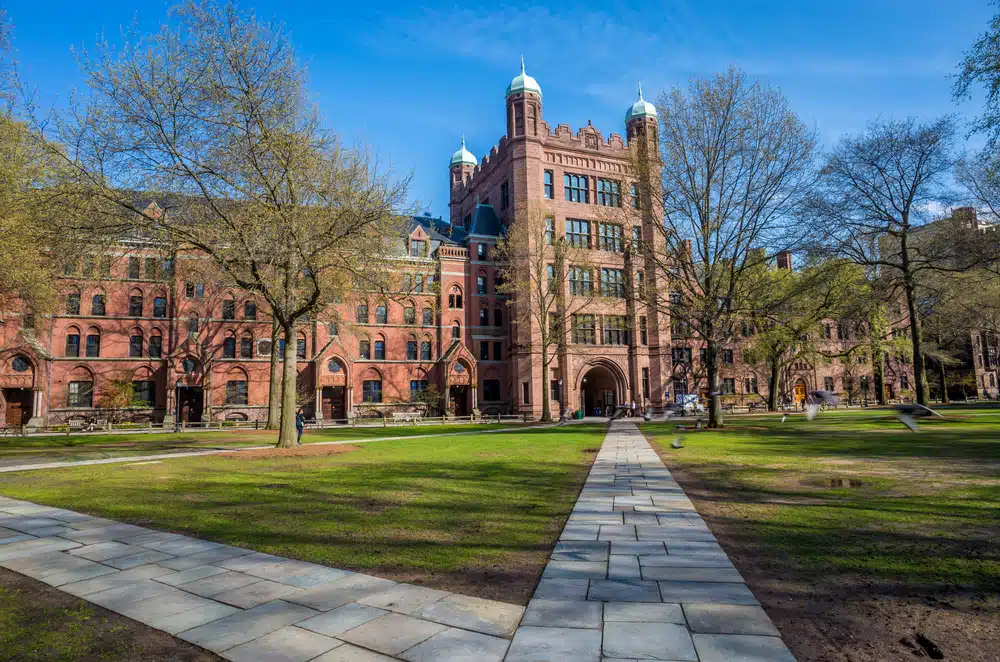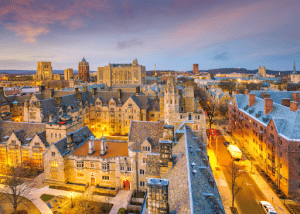How Big Is Yale University?
Yale University, one of the most prestigious Ivy League institutions, is known for its rich history, notable alumni, and renowned academic programs. But have you ever wondered just how big Yale University is in terms of its physical size, student population, and faculty and staff?
In this comprehensive article, we will explore the various dimensions of Yale University’s size and provide an in-depth look at its campus, student body, and the individuals who make up its faculty and staff.
Understanding the Size of Yale University
Before diving into the specific details, it’s important to grasp the overall size of Yale University. Established in 1701, the university is located in New Haven, Connecticut and covers a vast area of land. Let’s now delve deeper into the physical size of the campus and the numerous buildings that make up this prestigious institution.
Physical Size: Campus and Buildings
The Yale University campus spans approximately 373 acres, making it a substantial presence within the city of New Haven. With its Gothic-style architecture and picturesque courtyards, the campus serves as a stunning backdrop for both academic pursuits and student life. The campus is divided into distinct sections, each housing various academic, residential, and administrative buildings.
As you explore the campus, you’ll come across iconic structures such as the Sterling Memorial Library, Harkness Tower, and the Payne Whitney Gymnasium. These buildings not only showcase the university’s architectural splendor but also provide invaluable resources and facilities for students and faculty alike.
One notable feature of the campus is the Beinecke Rare Book & Manuscript Library, which houses an extensive collection of rare books, manuscripts, and other historical artifacts. The library’s unique architecture, with its translucent marble panels, allows natural light to filter into the reading rooms, creating a serene and inspiring atmosphere for scholars and researchers.
Another prominent building on campus is the Yale Center for British Art, which houses the largest collection of British art outside the United Kingdom. With over 2,000 paintings, 250 sculptures, and 20,000 drawings and prints, the center offers a rich cultural experience for students and visitors alike.
Student Population Size
Yale University is home to a diverse and vibrant student population. Currently, the university enrolls over 13,000 students across its undergraduate, graduate, and professional programs. This figure includes students from all 50 U.S. states and more than 120 countries, contributing to the university’s global appeal.
Within this student body, you’ll find a wide range of academic interests and extracurricular activities. From aspiring scientists conducting groundbreaking research to talented artists showcasing their work, Yale University provides a nurturing environment for students to explore their passions and develop their skills.
Furthermore, the university is committed to fostering a sense of community and inclusivity. With numerous student organizations, cultural centers, and support services, Yale ensures that every student has the opportunity to thrive academically, socially, and personally.
Faculty and Staff Size
In addition to its impressive student body, Yale University boasts a substantial faculty and staff team that plays a crucial role in shaping the academic and administrative landscape of the institution. Let’s take a closer look at the numbers.
Currently, Yale University employs over 5,000 faculty members who are experts in their respective fields. These dedicated professors bring a wealth of knowledge and experience to the classroom, providing students with a world-class education. From Nobel laureates to Pulitzer Prize winners, the faculty at Yale is truly exceptional.
Supporting the faculty are thousands of staff members who work tirelessly behind the scenes to ensure the smooth operation of the university. From librarians managing vast collections of books and resources to administrators coordinating various departments, the staff at Yale University are integral to its success.
Furthermore, the university is committed to creating an inclusive and supportive work environment for its faculty and staff. With numerous professional development opportunities, wellness programs, and employee resource groups, Yale University recognizes the importance of investing in its employees’ growth and well-being.
Breaking Down the Campus Size
Now that we have a general understanding of Yale University’s overall size, let’s explore the various components that make up its sprawling campus. From residential colleges to academic and research facilities, Yale offers a wide range of resources to foster a dynamic learning environment.
Yale University’s campus is not only vast in size but also rich in history and architectural beauty. As students traverse the grounds, they are greeted by stunning Gothic-style buildings, lush green spaces, and picturesque courtyards. Each corner of the campus tells a story, reflecting the university’s commitment to academic excellence and aesthetic appeal.
Residential Colleges and Housing
Yale University’s residential college system is an integral part of campus life. The university currently has 14 residential colleges, each providing a unique living and learning experience for students. These colleges serve as a home away from home, fostering a sense of community and camaraderie among students.
Within these residential colleges, students have access to comfortable housing accommodations, including dormitory-style rooms, common areas, and dining halls. This ensures that students have a supportive and inclusive environment to thrive academically and socially.
Moreover, the residential colleges offer a plethora of extracurricular activities, such as student-led organizations, cultural events, and academic programs. These opportunities allow students to further explore their interests, forge lifelong friendships, and develop leadership skills.
Academic and Research Facilities
Yale University prides itself on providing top-notch academic and research facilities to support its rigorous curriculum and groundbreaking research initiatives. Students have access to a vast array of specialized libraries, state-of-the-art laboratories, and cutting-edge technology to aid in their educational pursuits.
Whether a student’s passion lies in the sciences, humanities, or arts, Yale University’s academic facilities cater to a wide range of disciplines. The Sterling Memorial Library, for example, is a treasure trove of knowledge, housing millions of books, manuscripts, and rare collections. It serves as a sanctuary for students seeking quiet study spaces and a hub for intellectual exploration.
Furthermore, the university’s research facilities are at the forefront of innovation and discovery. From advanced medical research centers to interdisciplinary institutes, Yale provides the necessary resources for students and faculty to push the boundaries of knowledge and make meaningful contributions to their respective fields.
Recreational and Athletic Facilities
Recognizing the importance of a well-rounded education, Yale University places great emphasis on providing ample recreational and athletic facilities for its students. The university boasts extensive sports complexes, fitness centers, and outdoor recreational spaces.
These facilities cater to a diverse range of interests, from varsity athletics to recreational sports and wellness activities. The Payne Whitney Gymnasium, a historic landmark on campus, offers state-of-the-art fitness equipment, swimming pools, and basketball courts. It serves as a hub for physical fitness and a gathering place for students to engage in friendly competition and team sports.
Additionally, Yale’s outdoor recreational spaces provide students with opportunities to enjoy nature and engage in outdoor activities. The sprawling fields and scenic trails invite students to go for a jog, have a picnic, or simply unwind amidst the beauty of the campus.
Overall, Yale University’s campus is a vibrant and thriving community, offering a multitude of resources and opportunities for students to grow academically, socially, and personally. The combination of stunning architecture, world-class facilities, and a strong sense of community makes Yale an exceptional place for students to pursue their educational journey.
Analyzing the Student Body
As we continue our exploration of Yale University’s size, let’s turn our attention to the composition of its student body. Understanding the various demographics and backgrounds of the students at Yale provides valuable insights into the university’s diverse and inclusive environment.
Yale University is known for its commitment to fostering a vibrant and inclusive community, and this is evident in the composition of its student body. The university prides itself on attracting students from all walks of life, creating a rich tapestry of experiences and perspectives.
Undergraduate Students
Yale University is home to an undergraduate student population of around 6,000 students. These students come from a wide range of academic and cultural backgrounds, contributing to a rich and intellectually stimulating academic community.
Yale undergraduates benefit from small class sizes, allowing for personalized attention and meaningful interactions with faculty members. The close-knit community fosters an environment of collaboration and intellectual curiosity, ensuring that students receive a well-rounded education.
Within the undergraduate student body, there is a diverse array of interests and passions. Some students are deeply involved in research, working alongside faculty members to push the boundaries of knowledge in their respective fields. Others are engaged in community service, using their skills and knowledge to make a positive impact on society. Still, others are involved in the arts, showcasing their creativity and talent through various performances and exhibitions.
Yale University also takes pride in its commitment to diversity and inclusion. The university actively recruits students from underrepresented backgrounds, ensuring that all voices are heard and valued. This commitment to diversity extends beyond race and ethnicity, encompassing factors such as socioeconomic status, gender identity, and sexual orientation.
Graduate and Professional Students
In addition to its undergraduate programs, Yale University offers a diverse array of graduate and professional programs across various fields of study. These programs attract talented individuals from around the world who are seeking advanced education and specialized training.
Graduate and professional students at Yale benefit from engaging in cutting-edge research, collaborating with renowned faculty, and accessing an extensive network of industry professionals. This dynamic learning environment prepares students for successful careers in their respective fields.
Within the graduate and professional student community, there is a palpable sense of passion and dedication. These students are driven by a desire to make a lasting impact in their chosen fields, and they bring a wealth of knowledge and expertise to the Yale community.
Yale University recognizes the unique needs and challenges faced by graduate and professional students. To support their academic and personal development, the university offers a wide range of resources, including research grants, professional development workshops, and mentorship programs. These resources ensure that students have the tools they need to thrive during their time at Yale and beyond.
International Students
Yale University takes pride in its vibrant international community. International students comprise a significant portion of the student body, bringing diverse perspectives and cultural experiences to the campus and classroom.
For international students, Yale offers a range of resources and support services to facilitate their transition and integration into campus life. This includes cultural organizations, mentorship programs, and dedicated staff who provide guidance and assistance throughout their academic journey.
International students at Yale have the opportunity to engage in cross-cultural exchange, learning from their peers and sharing their own unique perspectives. This enriches the academic experience for all students and fosters a global mindset that is essential in today’s interconnected world.
Furthermore, Yale University actively seeks to create a welcoming and inclusive environment for international students. The university’s commitment to diversity and inclusion extends to its international community, ensuring that these students feel valued and supported throughout their time at Yale.
Overall, the composition of Yale University’s student body is a testament to the university’s commitment to diversity, inclusion, and academic excellence. The diverse backgrounds, experiences, and perspectives of its students contribute to a vibrant and intellectually stimulating community that prepares students for success in an increasingly globalized world.
The Size of Yale’s Faculty and Staff
To better understand the operations and academic support at Yale University, let’s explore the size and composition of its faculty and staff.
Academic Faculty
Yale University boasts an exceptional academic faculty comprising experts and scholars in their respective fields. Currently, the university employs over 1,200 tenured or tenure-track faculty members, ensuring that students receive instruction from leading experts in their disciplines.
Yale faculty members not only excel in their research and scholarship but also prioritize their commitment to teaching and mentoring students. This dedication to academic excellence fosters a stimulating learning environment that encourages intellectual growth and exploration.
Administrative Staff
In addition to the academic faculty, Yale University has a dedicated administrative staff that supports the university’s day-to-day operations. From admissions and financial aid to student services and campus maintenance, these staff members play a crucial role in ensuring the smooth functioning of the university.
The administrative staff works tirelessly behind the scenes to provide students with a seamless experience throughout their academic journey. Their efforts contribute to maintaining the high standards for which Yale is known and ensure that students have access to the resources and support they need.
Support Staff
Behind every successful institution are the dedicated individuals who provide vital support services. Yale University employs a sizable support staff that includes librarians, IT professionals, custodial staff, and more.
These unsung heroes play a pivotal role in maintaining the university’s infrastructure, providing technical support, and creating a clean and safe environment for students and faculty. Their contributions are essential to the overall functioning of Yale University.
Final Thoughts
Yale University’s size encompasses not only its physical campus but also its diverse student body and dedicated faculty and staff. With its expansive campus, robust academic and research facilities, and a vibrant community of students and professionals, Yale offers a rich and comprehensive educational experience. The university’s commitment to excellence in teaching, research, and holistic student support establishes Yale as a cornerstone of academic excellence in the United States and beyond.
How AdmissionSight Can Help You With College Admissions
AdmissionSight is a college consulting firm that provides personalized assistance to students throughout the college admissions process. Here are some ways that AdmissionSight can help you:
Admissions strategy: AdmissionSight can help you develop a strategic plan for your college application process. Our professional consultants can assist with identifying schools that are a good fit for your academic, extracurricular, and personal goals and help you plan and prioritize your application strategy.
Application review: AdmissionSight can review your application and provide feedback on how to improve it. We can offer suggestions on making your application stand out and highlighting your strengths and unique qualities.
Essay coaching: AdmissionSight can help you craft compelling essays that showcase your personality, goals, and achievements. We can guide you through the essay writing process and provide feedback on your drafts to help you refine your writing.
Interview preparation: AdmissionSight can provide interview coaching to help you feel confident and prepared for college interviews. Our experts can offer tips on how to present yourself professionally and how to answer common interview questions.
Extracurricular planning: AdmissionSight can help you plan and develop your extracurricular activities to make them more impactful and meaningful. We can suggest activities that align with your interests and goals and provide guidance on demonstrating your leadership and initiative.
Overall, AdmissionSight can provide valuable guidance and support throughout the college admissions process to help you maximize your chances of getting accepted into the college of your choice.
With a high success rate of over 75%, we have built a strong network in the past decade. Book an initial consultation today, free of charge!










































